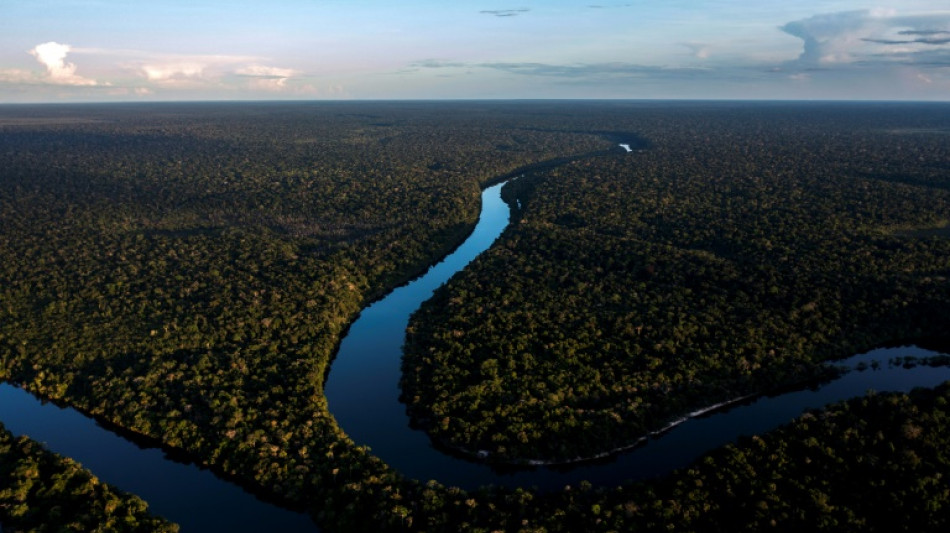
-
 France's most powerful nuclear reactor finally comes on stream
France's most powerful nuclear reactor finally comes on stream
-
Ski great Vonn finishes 14th on World Cup return

-
 Scholz visits site of deadly Christmas market attack
Scholz visits site of deadly Christmas market attack
-
Heavyweight foes Usyk, Fury set for titanic rematch

-
 Drone attack hits Russian city 1,000km from Ukraine frontier
Drone attack hits Russian city 1,000km from Ukraine frontier
-
Former England winger Eastham dies aged 88

-
 Pakistan Taliban claim raid killing 16 soldiers
Pakistan Taliban claim raid killing 16 soldiers
-
Pakistan military courts convict 25 of pro-Khan unrest

-
 US Congress passes bill to avert shutdown
US Congress passes bill to avert shutdown
-
Sierra Leone student tackles toxic air pollution

-
 German leader to visit site of deadly Christmas market attack
German leader to visit site of deadly Christmas market attack
-
16 injured after Israel hit by Yemen-launched 'projectile'

-
 Google counters bid by US to force sale of Chrome
Google counters bid by US to force sale of Chrome
-
Russia says Kursk strike kills 5 after Moscow claims deadly Kyiv attack

-
 Cavaliers cruise past Bucks, Embiid shines in Sixers win
Cavaliers cruise past Bucks, Embiid shines in Sixers win
-
US President Biden authorizes $571 million in military aid to Taiwan

-
 Arahmaiani: the Indonesian artist with a thousand lives
Arahmaiani: the Indonesian artist with a thousand lives
-
Indonesians embrace return of plundered treasure from the Dutch

-
 Qualcomm scores key win in licensing dispute with Arm
Qualcomm scores key win in licensing dispute with Arm
-
Scientists observe 'negative time' in quantum experiments

-
 US approves first drug treatment for sleep apnea
US approves first drug treatment for sleep apnea
-
US drops bounty for Syria's new leader after Damascus meeting

-
 Saudi man arrested after deadly car attack on German Christmas market
Saudi man arrested after deadly car attack on German Christmas market
-
'Torn from my side': horror of German Christmas market attack

-
 Bayern Munich rout Leipzig on sombre night in Germany
Bayern Munich rout Leipzig on sombre night in Germany
-
Tiger in family golf event but has 'long way' before PGA return

-
 Pogba wants to 'turn page' after brother sentenced in extortion case
Pogba wants to 'turn page' after brother sentenced in extortion case
-
Court rules against El Salvador in controversial abortion case

-
 French court hands down heavy sentences in teacher beheading trial
French court hands down heavy sentences in teacher beheading trial
-
Israel army says troops shot Syrian protester in leg

-
 Tien sets-up all-American NextGen semi-final duel
Tien sets-up all-American NextGen semi-final duel
-
Bulked-up Fury promises 'war' in Usyk rematch

-
 Major reshuffle as Trudeau faces party pressure, Trump taunts
Major reshuffle as Trudeau faces party pressure, Trump taunts
-
Reggaeton star Daddy Yankee in court, says wife embezzled $100 mn

-
 Injured Eze out of Palace's clash with Arsenal
Injured Eze out of Palace's clash with Arsenal
-
Norway's Deila named coach of MLS Atlanta United

-
 Inter-American Court rules Colombia drilling violated native rights
Inter-American Court rules Colombia drilling violated native rights
-
Amazon expects no disruptions as US strike goes into 2nd day

-
 Man Utd 'more in control' under Amorim says Iraola
Man Utd 'more in control' under Amorim says Iraola
-
Emery insists Guardiola 'still the best' despite Man City slump

-
 US confirms billions in chips funds to Samsung, Texas Instruments
US confirms billions in chips funds to Samsung, Texas Instruments
-
English Rugby Football Union chairman quits amid pay row

-
 Major reshuffle as Trudeau faces party pressure, Trump attacks
Major reshuffle as Trudeau faces party pressure, Trump attacks
-
Gatland remains as Wales boss but must 'change fortunes on the pitch'

-
 Argentina's dollar craze cools under greenback-loving Milei
Argentina's dollar craze cools under greenback-loving Milei
-
Medici secret passageway in Florence reopens after refit

-
 Anger after Musk backs German far right
Anger after Musk backs German far right
-
Arteta says 'best is yet to come' as he marks five years at Arsenal

-
 Pereira happy to achieve Premier League 'target' with Wolves
Pereira happy to achieve Premier League 'target' with Wolves
-
'Dark lull' in German energy transition sparks political debate


Can biodiversity credits unlock billions for nature?
For supporters, biodiversity credits could unlock billions in much-needed funding for nature, but critics fear a repeat of scandals that have dogged other financial approaches to protecting the environment.
Paying to safeguard tropical rainforests or compensate for habitat destruction is an area of growing interest, and trading credits in conservation will feature at this month's UN COP16 biodiversity summit in Colombia.
The market in biodiversity credits or certificates -- which monetise activities that claim to protect or restore nature -- is new, unregulated and stalked by fears of "greenwashing".
Backers say credits could financially compensate for ecological harm caused by industry, for example when a mine or road project impacts the surrounding environment.
Businesses could, in theory at least, offset damage by purchasing credits from organisations that support nature and biodiversity through wetland conservation or sustainable rubber production, for example.
Ensuring integrity -- in short, that credits actually do for the environment what they promise -- is an enormous challenge for a sector that has no common international standards to speak of.
The voluntary market in carbon credits stalled after revelations that some of the most widely traded offsets did not reduce heat-warming greenhouse gas emissions as promised.
But at the last biodiversity COP nations agreed to earmark $200 billion a year for nature by 2030, and credits are being seen as one way to raise the cash.
- Gaining traction -
That agreement encouraged nations to promote "innovative schemes" including biodiversity offsets and credits.
Businesses and governments hope that COP16 in Cali -- which starts October 21 and is expected to attract 12,000 attendees -- can boost confidence in biodiversity credits.
The International Advisory Panel on Biodiversity Credits, an independent body supported by the governments of France and Britain, is to present a "global roadmap" for the sector.
It wants to encourage countries to have strong national credit schemes rather than strive for standard rules for international trade, which many admit could be unfeasible.
The Alliance for Biodiversity Credits, backed by the UN, and the World Economic Forum is also looking to promote initiatives at the Cali meet.
Elsewhere, similar proposals are attracting high-profile support.
In September, European Commission president Ursula von der Leyen called for the creation of a "nature credits" market to "reward those who serve our planet", pointing to farmers involved in sustainable agriculture.
Brazilian President Luiz Inacio Lula da Silva has mooted a global fund for rainforest conservation that considers paying countries for areas of forest that are protected or restored.
- Challenges -
Many environment groups are wary, fearing money generated from biodiversity credits will not benefit conservation or indigenous communities living closely with nature.
The idea of "selling nature to save it" has been around for decades and today, companies everywhere proudly display their sustainability commitments in product advertising or annual reports.
But the idea has not gone global, and creating common international rules for the trade of biodiversity credits could prove insurmountable.
Discussions around international standards for the trade of carbon credits -- where companies or countries pay to offset their greenhouse gas emissions -- are far more advanced.
But UN efforts to enshrine a globally-accepted framework has not concluded, and the COP28 in the United Arab Emirates last year ended without agreement on the issue.
This bodes ill for biodiversity credits, which have their own set of unique challenges.
Carbon offsets, for example, are at least based on the same, consistent unit -- a single credit represents one tonne of carbon dioxide either removed from the atmosphere or prevented from entering it.
"For biodiversity, we don't really have a metric," said Alain Karsenty, economist at the French agricultural research organisation CIRAD.
"A credit that would compensate for the destruction of a forest in France with a forest in Gabon would make no sense" because the two are not comparable or interchangeable, he said.
V.Fontes--PC




